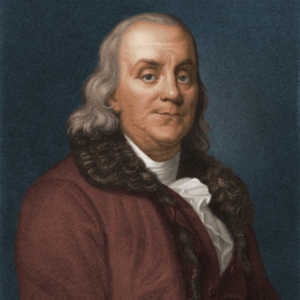 Born in Boston in 1706, Benjamin Franklin left school at age 10 to work in his father’s candle shop.
Born in Boston in 1706, Benjamin Franklin left school at age 10 to work in his father’s candle shop.
In 1718, Franklin apprenticed to his brother James, a printer and founder of Boston’s New England Courant. Franklin read voraciously, contributed anonymous articles to his brother’s newspaper, and managed the paper while his brother was imprisoned for a political offense.
At 17, Franklin ran away and ended up in Philadelphia, where he found work as a printer. Franklin started his own print shop by 1728 and purchased The Pennsylvania Gazette. His wildly successful Poor Richard’s Almanack secured his fortune.
Franklin was appointed postmaster of Philadelphia by the British Crown Post in 1737. Newspaper publishers often served as postmasters, which helped them to gather and distribute news. Postmasters decided which newspapers could travel free in the mail — or in the mail at all.
Postmaster General Elliott Benger added to Franklin’s duties by making him comptroller, with financial oversight for nearby Post Offices. Franklin lobbied the British to succeed Benger when his health failed and, with Virginia’s William Hunter, was named joint postmaster general for the Crown on August 10, 1753.
Franklin surveyed post roads and Post Offices, introduced a simple accounting method for postmasters, and had riders carry mail both night and day. He encouraged postmasters to establish the penny post where letters not called for at the Post Office were delivered for a penny. Remembering his experience with the Gazette, Franklin mandated delivery of all newspapers for a small fee. His efforts contributed to the Crown’s first North American profit in 1760.
In 1757, while serving as joint postmaster general, Franklin went to London to represent Pennsylvania’s government. In 1763, back in the colonies, he traveled 1,600 miles surveying post roads and Post Offices from Virginia to New England.
In 1764, Franklin returned to London, where he represented the interests of several colonial governments. In 1774, judged too sympathetic to the colonies, he was dismissed as joint postmaster general.
First Postmaster General under the Continental Congress
Back on American soil in 1775, Franklin served as a member of the Second Continental Congress, which appointed him Postmaster General on July 26 of that year. With an annual salary of $1,000 and $340 for a secretary and comptroller, Franklin was responsible for all Post Offices from Massachusetts to Georgia and had authority to hire postmasters as necessary.
Founding Father of a New Nation
In 1776, Franklin worked with the committee that created the Declaration of Independence, then left for Paris to secure French support for the war with England. The treaty of alliance he negotiated in 1778 was vital to the success of the American Revolution. Later, Franklin helped negotiate the peace treaty with Great Britain.
Franklin returned to Philadelphia in 1785. He attended the Constitutional Convention in 1787 and lived to see the Constitution adopted. He died April 17, 1790.
Franklin was a man of many talents. He helped establish a library, fire company, academy, philosophical society, militia, hospital, and better streets and street lighting in Philadelphia. His scientific contributions included a study of electricity and lightning, theories of heat absorption, measurement of the Gulf Stream, and invention of the lightning rod, bifocals, and the Franklin stove.
Biographer Carl Van Doren wrote:
In any age, in any place, Franklin would have been great … (N)umerous as his achievements were, they were less than he was.

